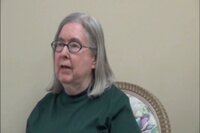| Title |
Charlesworth, Rosalind OH3_024 |
| Creator |
Weber State University, Stewart Library: Oral History Program |
| Contributors |
Charlesworth, Rosalind, Interviewee; Weeks, Jamie J., Interviewer; Gallagher, Stacie, Technician |
| Collection Name |
Weber State University Oral Histories |
| Description |
The Weber State University Oral History Project began conducting interviews with key Weber State University faculty, administrators, staff and students, in Fall 2007. The program focuses primarily on obtaining a historical record of the school along with important developments since the school gained university status in 1990. The interviews explore the process of achieving university status, as well as major issues including accreditation, diversity, faculty governance, changes in leadership, curricular developments, etc. |
| Image Captions |
Rosalind Charlesworth, October 17, 2013 |
| Biographical/Historical Note |
The following includes the transcript and a video clip from an oral history interview with Rosalind Charlesworth. |
| Subject |
Ogden (Utah); Weber State University |
| Digital Publisher |
Stewart Library, Weber State University, Ogden, Utah, USA |
| Date |
2013 |
| Date Digital |
2016 |
| Temporal Coverage |
1993; 1994; 1995; 1996; 1997; 1998; 1999; 2000; 2001; 2002; 2003; 2004; 2005; 2006; 2007; 2008; 2009; 2010; 2011; 2012; 2013 |
| Medium |
oral histories (literary genre) |
| Spatial Coverage |
Ogden, Weber County, Utah, United States, http://sws.geonames.org/11788968, 41.22809, -111.96766 |
| Type |
Text; Image/MovingImage |
| Conversion Specifications |
Filmed using a Sony HDR-CX430V digital video camera. Sound was recorded with a Sony ECM-AW3(T) bluetooth microphone. Transcribed using WAVpedal 5 Copyrighted by The Programmers' Consortium Inc. Digitally reformatted using Adobe Acrobat Xl Pro. |
| Language |
eng |
| Rights |
Materials may be used for non-profit and educational purposes, please credit University Archives, Stewart Library; Weber State University. |
| Source |
Charlesworth, Rosalind OH3_024; Weber State University, Stewart Library, University Archives |
| Format |
application/pdf; video/mp4 |
| ARK |
ark:/87278/s6qzc4wg |
| Setname |
wsu_oh |
| ID |
111898 |
| Reference URL |
https://digital.weber.edu/ark:/87278/s6qzc4wg |
| Title |
Charlesworth, Rosalind OH3_024 |
| Creator |
Weber State University, Stewart Library: Oral History Program |
| Contributors |
Charlesworth, Rosalind, Interviewee; Weeks, Jamie J., Interviewer; Gallagher, Stacie, Technician |
| Description |
The Weber State University Oral History Project began conducting interviews with key Weber State University faculty, administrators, staff and students, in Fall 2007. The program focuses primarily on obtaining a historical record of the school along with important developments since the school gained university status in 1990. The interviews explore the process of achieving university status, as well as major issues including accreditation, diversity, faculty governance, changes in leadership, curricular developments, etc. |
| Image Captions |
Rosalind Charlesworth, October 17, 2013 |
| Biographical/Historical Note |
The following is an oral history interview with Dr. Rosalind Charlesworth conducted by Jamie J. Weeks on October 17, 2013 in the Waterstradt room of the Stewart Library. During the interview, Dr. Charlesworth discusses her background and her time spent at Weber State University from 1993 to 2006 as a professor in the College of Education. |
| Subject |
Ogden (Utah); Weber State University; Education |
| Digital Publisher |
Stewart Library, Weber State University, Ogden, Utah, USA |
| Date |
2013 |
| Date Digital |
2016 |
| Temporal Coverage |
1993-2013 |
| Medium |
oral histories (literary genre) |
| Spatial Coverage |
Ogden, Weber County, Utah, United States, http://sws.geonames.org/11788968, 41.22809, -111.96766 |
| Type |
Text; Image/MovingImage |
| Conversion Specifications |
Filmed using a Sony HDR-CX430V digital video camera. Sound was recorded with a Sony ECM-AW3(T) bluetooth microphone. Transcribed using WAVpedal 5 Copyrighted by The Programmers' Consortium Inc. Digitally reformatted using Adobe Acrobat Xl Pro. |
| Language |
eng |
| Rights |
Materials may be used for non-profit and educational purposes, please credit University Archives, Stewart Library; Weber State University. |
| Source |
Charlesworth, Rosalind OH3_024; Weber State University, Stewart Library, University Archives |
| Format |
application/pdf |
| Setname |
wsu_oh |
| ID |
111939 |
| Reference URL |
https://digital.weber.edu/ark:/87278/s6qzc4wg/111939 |





